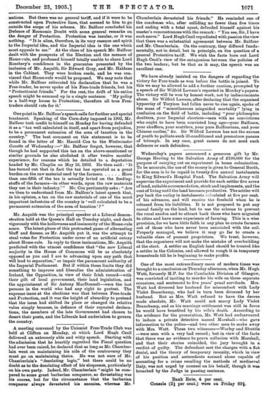One point in Mr. Balfour's speech calls for further and
special treatment. Speaking of the Corn-duty imposed in 1902, Mr. Balfour took credit to himself on Monday for baying defended it as a " tax well calculated in itself, and apart from prejudice, to be a permanent extension of the area of taxation in the country." The best comment on this statement is to be found in the letter of Mr. Harold Cox to the Westminster Gazette of Wednesday :—" Mr. Balfour forgot, however, that though he had supported this tax on the above-mentioned or similar grounds he also abolished it after twelve months' experience, for reasons which he detailed to a deputation headed by Mr. Chaplin on May 16, 1903. He then said : It has turned out that in fact the tax has operated as a great burden on the raw material used by the farmers More than one-fifth of the tax is actually levied on the feeding- stuffs of the farmers—in other words, upon the raw materials they use in their industry.' " Mr. Cox pertinently asks : " Are we then to understand from Mr. Balfour's latest speech that, in his opinion, a tax on the raw materials of one of the most important industries of the country is ' well calculated to be a permanent extension of the area of taxation' ? "






































 Previous page
Previous page